Mental Health Services for Working-Age Adults with Depression
VerifiedAdded on 2023/06/12
|8
|3047
|484
AI Summary
This report discusses mental health services for working-age adults with depression. It covers the perspective of service users and the support mechanisms involved in the process of supporting recovery. The report also includes the view of a service user who is facing mental health problems.
Contribute Materials
Your contribution can guide someone’s learning journey. Share your
documents today.
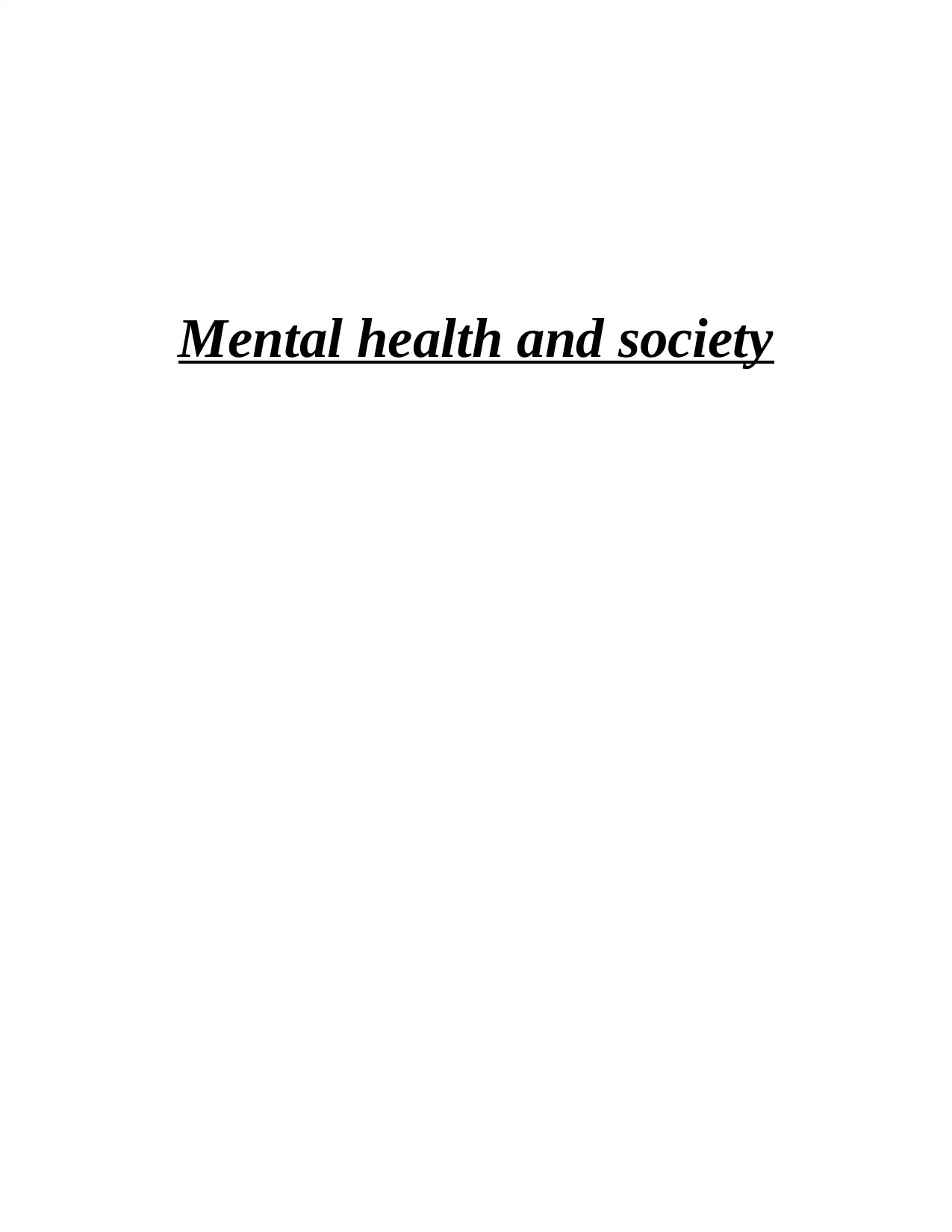
Mental health and society
Secure Best Marks with AI Grader
Need help grading? Try our AI Grader for instant feedback on your assignments.
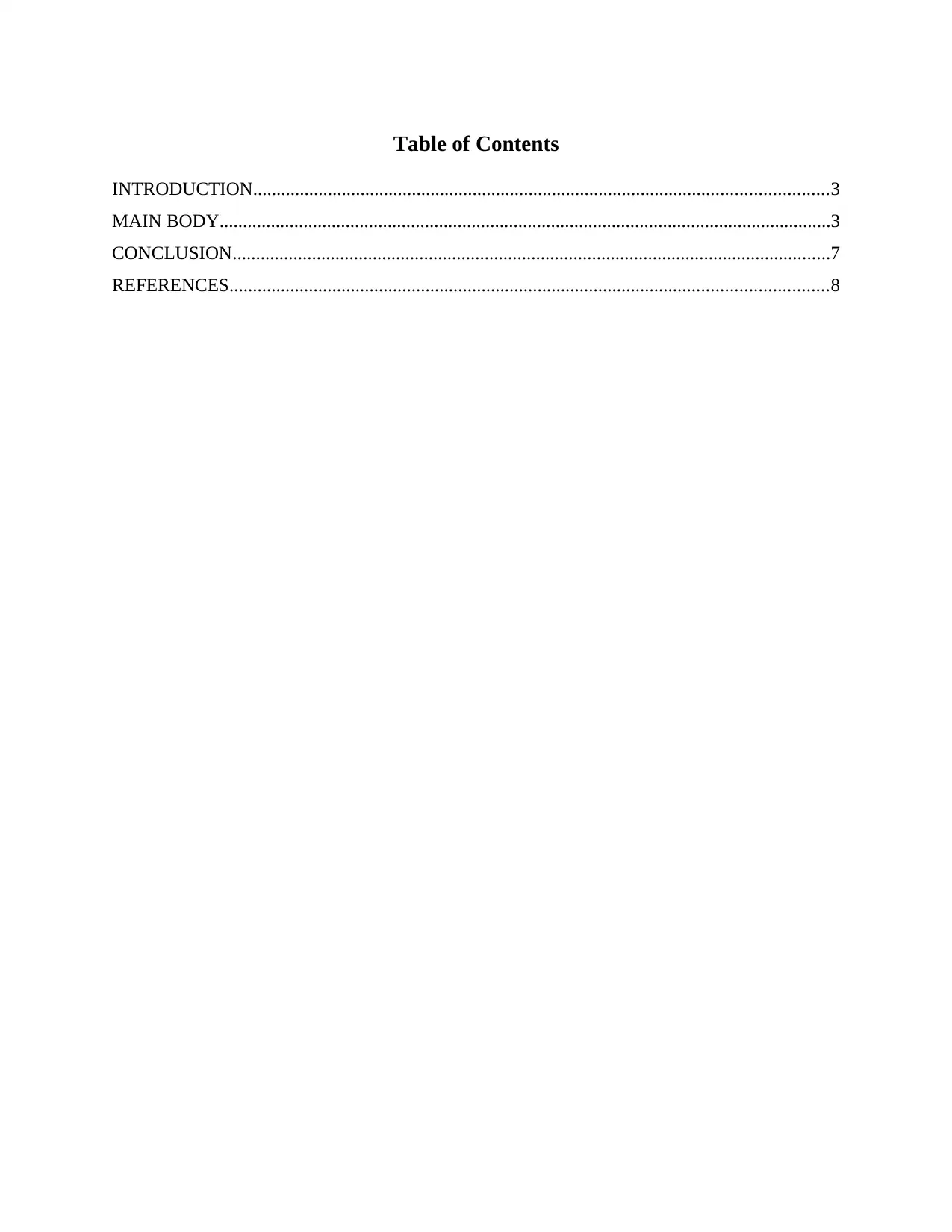
Table of Contents
INTRODUCTION...........................................................................................................................3
MAIN BODY...................................................................................................................................3
CONCLUSION................................................................................................................................7
REFERENCES................................................................................................................................8
INTRODUCTION...........................................................................................................................3
MAIN BODY...................................................................................................................................3
CONCLUSION................................................................................................................................7
REFERENCES................................................................................................................................8
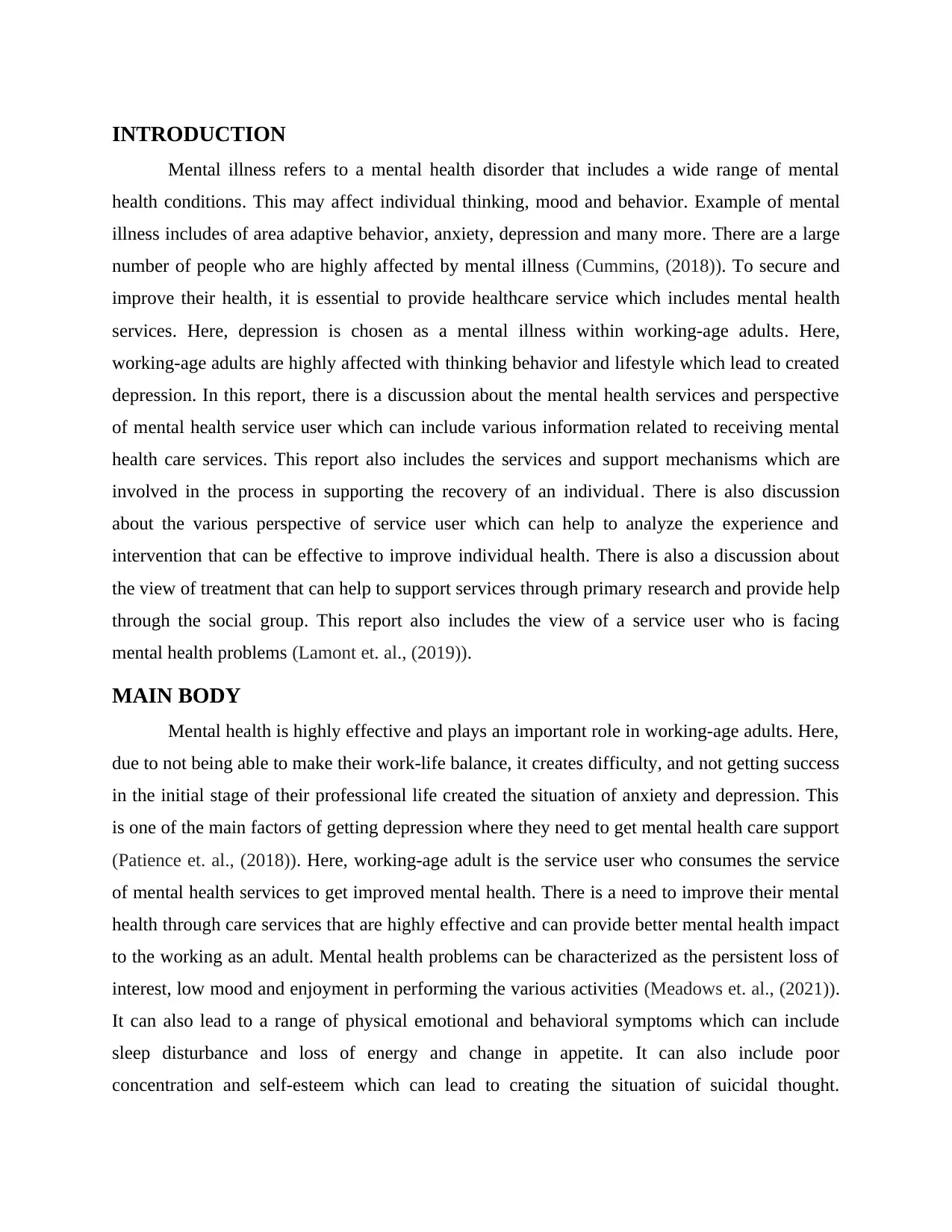
INTRODUCTION
Mental illness refers to a mental health disorder that includes a wide range of mental
health conditions. This may affect individual thinking, mood and behavior. Example of mental
illness includes of area adaptive behavior, anxiety, depression and many more. There are a large
number of people who are highly affected by mental illness (Cummins, (2018)). To secure and
improve their health, it is essential to provide healthcare service which includes mental health
services. Here, depression is chosen as a mental illness within working-age adults. Here,
working-age adults are highly affected with thinking behavior and lifestyle which lead to created
depression. In this report, there is a discussion about the mental health services and perspective
of mental health service user which can include various information related to receiving mental
health care services. This report also includes the services and support mechanisms which are
involved in the process in supporting the recovery of an individual. There is also discussion
about the various perspective of service user which can help to analyze the experience and
intervention that can be effective to improve individual health. There is also a discussion about
the view of treatment that can help to support services through primary research and provide help
through the social group. This report also includes the view of a service user who is facing
mental health problems (Lamont et. al., (2019)).
MAIN BODY
Mental health is highly effective and plays an important role in working-age adults. Here,
due to not being able to make their work-life balance, it creates difficulty, and not getting success
in the initial stage of their professional life created the situation of anxiety and depression. This
is one of the main factors of getting depression where they need to get mental health care support
(Patience et. al., (2018)). Here, working-age adult is the service user who consumes the service
of mental health services to get improved mental health. There is a need to improve their mental
health through care services that are highly effective and can provide better mental health impact
to the working as an adult. Mental health problems can be characterized as the persistent loss of
interest, low mood and enjoyment in performing the various activities (Meadows et. al., (2021)).
It can also lead to a range of physical emotional and behavioral symptoms which can include
sleep disturbance and loss of energy and change in appetite. It can also include poor
concentration and self-esteem which can lead to creating the situation of suicidal thought.
Mental illness refers to a mental health disorder that includes a wide range of mental
health conditions. This may affect individual thinking, mood and behavior. Example of mental
illness includes of area adaptive behavior, anxiety, depression and many more. There are a large
number of people who are highly affected by mental illness (Cummins, (2018)). To secure and
improve their health, it is essential to provide healthcare service which includes mental health
services. Here, depression is chosen as a mental illness within working-age adults. Here,
working-age adults are highly affected with thinking behavior and lifestyle which lead to created
depression. In this report, there is a discussion about the mental health services and perspective
of mental health service user which can include various information related to receiving mental
health care services. This report also includes the services and support mechanisms which are
involved in the process in supporting the recovery of an individual. There is also discussion
about the various perspective of service user which can help to analyze the experience and
intervention that can be effective to improve individual health. There is also a discussion about
the view of treatment that can help to support services through primary research and provide help
through the social group. This report also includes the view of a service user who is facing
mental health problems (Lamont et. al., (2019)).
MAIN BODY
Mental health is highly effective and plays an important role in working-age adults. Here,
due to not being able to make their work-life balance, it creates difficulty, and not getting success
in the initial stage of their professional life created the situation of anxiety and depression. This
is one of the main factors of getting depression where they need to get mental health care support
(Patience et. al., (2018)). Here, working-age adult is the service user who consumes the service
of mental health services to get improved mental health. There is a need to improve their mental
health through care services that are highly effective and can provide better mental health impact
to the working as an adult. Mental health problems can be characterized as the persistent loss of
interest, low mood and enjoyment in performing the various activities (Meadows et. al., (2021)).
It can also lead to a range of physical emotional and behavioral symptoms which can include
sleep disturbance and loss of energy and change in appetite. It can also include poor
concentration and self-esteem which can lead to creating the situation of suicidal thought.
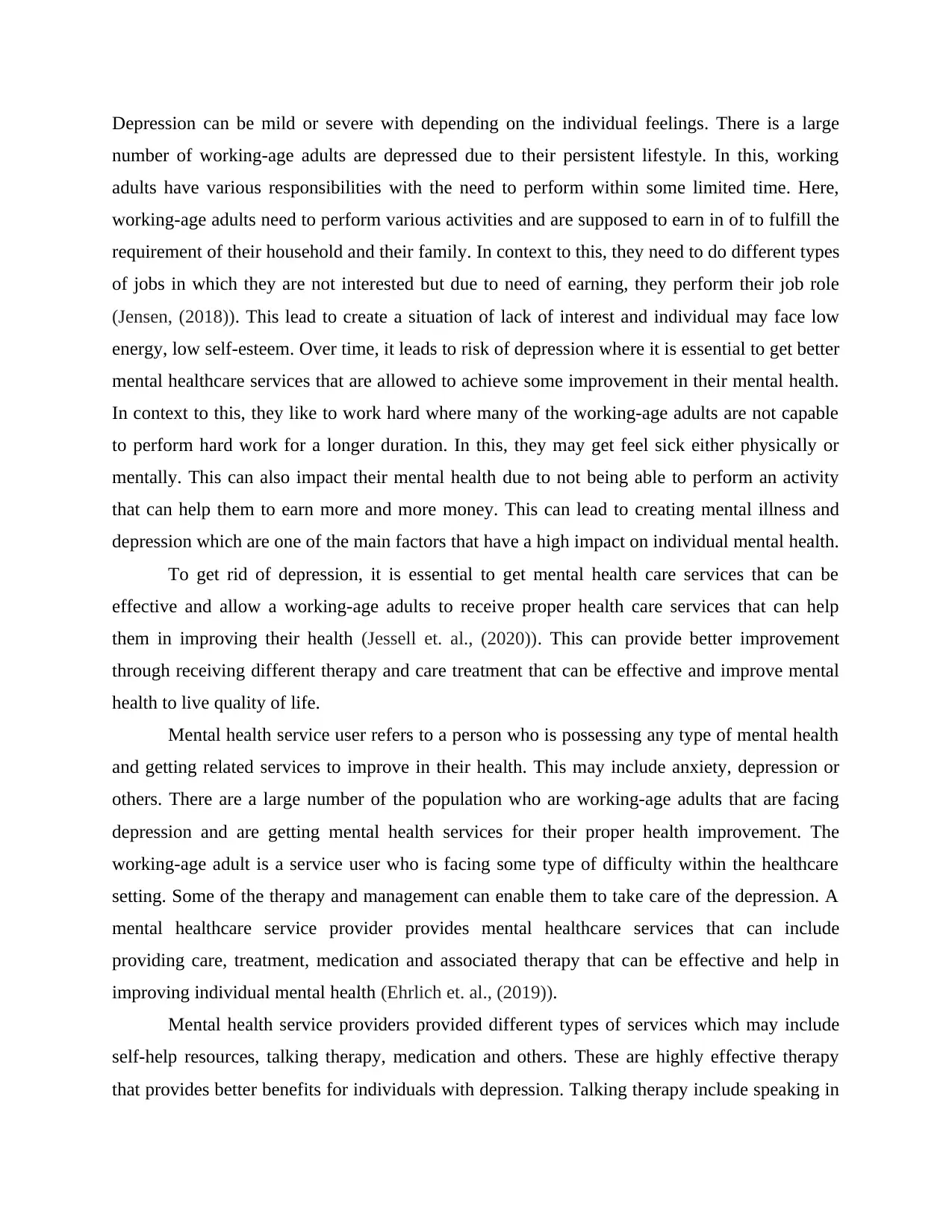
Depression can be mild or severe with depending on the individual feelings. There is a large
number of working-age adults are depressed due to their persistent lifestyle. In this, working
adults have various responsibilities with the need to perform within some limited time. Here,
working-age adults need to perform various activities and are supposed to earn in of to fulfill the
requirement of their household and their family. In context to this, they need to do different types
of jobs in which they are not interested but due to need of earning, they perform their job role
(Jensen, (2018)). This lead to create a situation of lack of interest and individual may face low
energy, low self-esteem. Over time, it leads to risk of depression where it is essential to get better
mental healthcare services that are allowed to achieve some improvement in their mental health.
In context to this, they like to work hard where many of the working-age adults are not capable
to perform hard work for a longer duration. In this, they may get feel sick either physically or
mentally. This can also impact their mental health due to not being able to perform an activity
that can help them to earn more and more money. This can lead to creating mental illness and
depression which are one of the main factors that have a high impact on individual mental health.
To get rid of depression, it is essential to get mental health care services that can be
effective and allow a working-age adults to receive proper health care services that can help
them in improving their health (Jessell et. al., (2020)). This can provide better improvement
through receiving different therapy and care treatment that can be effective and improve mental
health to live quality of life.
Mental health service user refers to a person who is possessing any type of mental health
and getting related services to improve in their health. This may include anxiety, depression or
others. There are a large number of the population who are working-age adults that are facing
depression and are getting mental health services for their proper health improvement. The
working-age adult is a service user who is facing some type of difficulty within the healthcare
setting. Some of the therapy and management can enable them to take care of the depression. A
mental healthcare service provider provides mental healthcare services that can include
providing care, treatment, medication and associated therapy that can be effective and help in
improving individual mental health (Ehrlich et. al., (2019)).
Mental health service providers provided different types of services which may include
self-help resources, talking therapy, medication and others. These are highly effective therapy
that provides better benefits for individuals with depression. Talking therapy include speaking in
number of working-age adults are depressed due to their persistent lifestyle. In this, working
adults have various responsibilities with the need to perform within some limited time. Here,
working-age adults need to perform various activities and are supposed to earn in of to fulfill the
requirement of their household and their family. In context to this, they need to do different types
of jobs in which they are not interested but due to need of earning, they perform their job role
(Jensen, (2018)). This lead to create a situation of lack of interest and individual may face low
energy, low self-esteem. Over time, it leads to risk of depression where it is essential to get better
mental healthcare services that are allowed to achieve some improvement in their mental health.
In context to this, they like to work hard where many of the working-age adults are not capable
to perform hard work for a longer duration. In this, they may get feel sick either physically or
mentally. This can also impact their mental health due to not being able to perform an activity
that can help them to earn more and more money. This can lead to creating mental illness and
depression which are one of the main factors that have a high impact on individual mental health.
To get rid of depression, it is essential to get mental health care services that can be
effective and allow a working-age adults to receive proper health care services that can help
them in improving their health (Jessell et. al., (2020)). This can provide better improvement
through receiving different therapy and care treatment that can be effective and improve mental
health to live quality of life.
Mental health service user refers to a person who is possessing any type of mental health
and getting related services to improve in their health. This may include anxiety, depression or
others. There are a large number of the population who are working-age adults that are facing
depression and are getting mental health services for their proper health improvement. The
working-age adult is a service user who is facing some type of difficulty within the healthcare
setting. Some of the therapy and management can enable them to take care of the depression. A
mental healthcare service provider provides mental healthcare services that can include
providing care, treatment, medication and associated therapy that can be effective and help in
improving individual mental health (Ehrlich et. al., (2019)).
Mental health service providers provided different types of services which may include
self-help resources, talking therapy, medication and others. These are highly effective therapy
that provides better benefits for individuals with depression. Talking therapy include speaking in
Secure Best Marks with AI Grader
Need help grading? Try our AI Grader for instant feedback on your assignments.
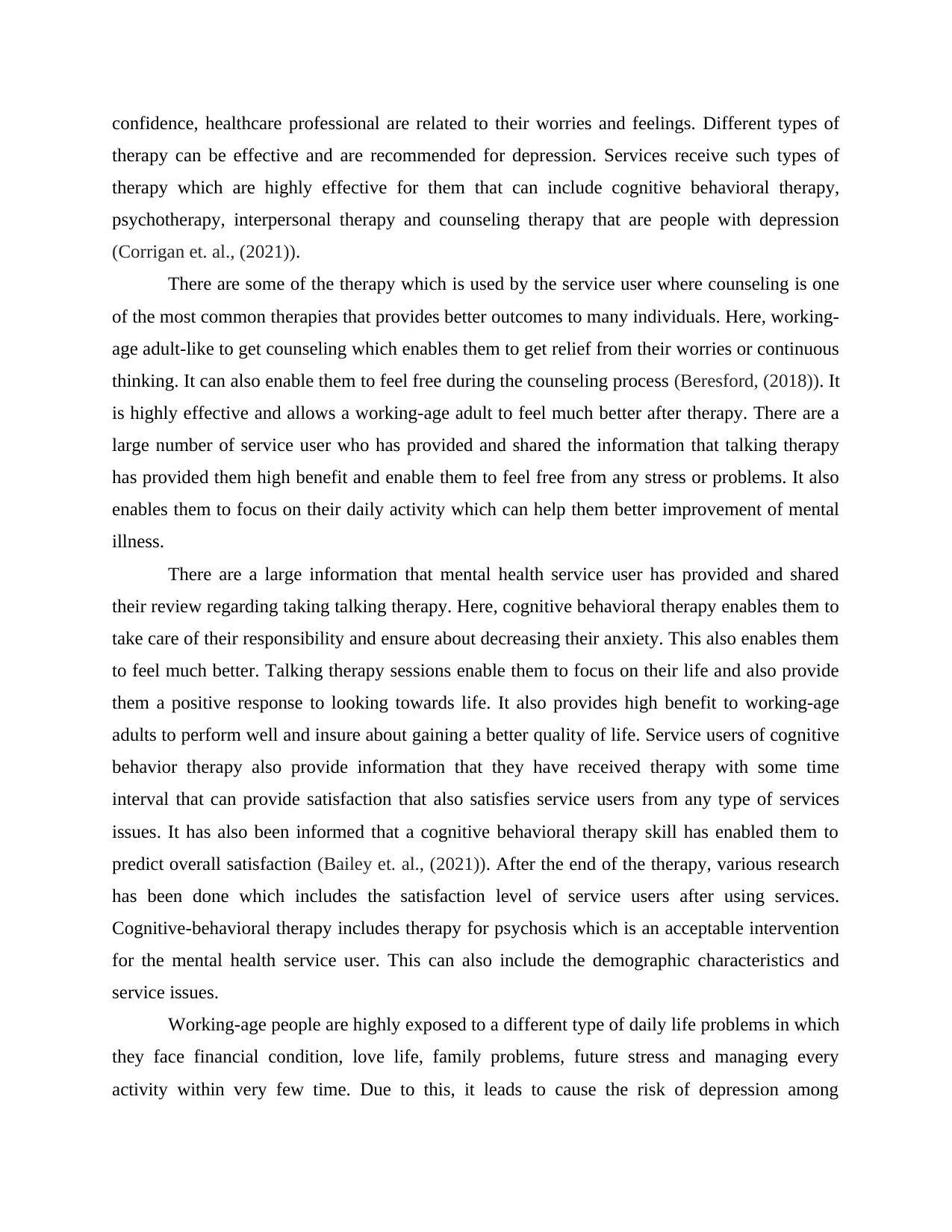
confidence, healthcare professional are related to their worries and feelings. Different types of
therapy can be effective and are recommended for depression. Services receive such types of
therapy which are highly effective for them that can include cognitive behavioral therapy,
psychotherapy, interpersonal therapy and counseling therapy that are people with depression
(Corrigan et. al., (2021)).
There are some of the therapy which is used by the service user where counseling is one
of the most common therapies that provides better outcomes to many individuals. Here, working-
age adult-like to get counseling which enables them to get relief from their worries or continuous
thinking. It can also enable them to feel free during the counseling process (Beresford, (2018)). It
is highly effective and allows a working-age adult to feel much better after therapy. There are a
large number of service user who has provided and shared the information that talking therapy
has provided them high benefit and enable them to feel free from any stress or problems. It also
enables them to focus on their daily activity which can help them better improvement of mental
illness.
There are a large information that mental health service user has provided and shared
their review regarding taking talking therapy. Here, cognitive behavioral therapy enables them to
take care of their responsibility and ensure about decreasing their anxiety. This also enables them
to feel much better. Talking therapy sessions enable them to focus on their life and also provide
them a positive response to looking towards life. It also provides high benefit to working-age
adults to perform well and insure about gaining a better quality of life. Service users of cognitive
behavior therapy also provide information that they have received therapy with some time
interval that can provide satisfaction that also satisfies service users from any type of services
issues. It has also been informed that a cognitive behavioral therapy skill has enabled them to
predict overall satisfaction (Bailey et. al., (2021)). After the end of the therapy, various research
has been done which includes the satisfaction level of service users after using services.
Cognitive-behavioral therapy includes therapy for psychosis which is an acceptable intervention
for the mental health service user. This can also include the demographic characteristics and
service issues.
Working-age people are highly exposed to a different type of daily life problems in which
they face financial condition, love life, family problems, future stress and managing every
activity within very few time. Due to this, it leads to cause the risk of depression among
therapy can be effective and are recommended for depression. Services receive such types of
therapy which are highly effective for them that can include cognitive behavioral therapy,
psychotherapy, interpersonal therapy and counseling therapy that are people with depression
(Corrigan et. al., (2021)).
There are some of the therapy which is used by the service user where counseling is one
of the most common therapies that provides better outcomes to many individuals. Here, working-
age adult-like to get counseling which enables them to get relief from their worries or continuous
thinking. It can also enable them to feel free during the counseling process (Beresford, (2018)). It
is highly effective and allows a working-age adult to feel much better after therapy. There are a
large number of service user who has provided and shared the information that talking therapy
has provided them high benefit and enable them to feel free from any stress or problems. It also
enables them to focus on their daily activity which can help them better improvement of mental
illness.
There are a large information that mental health service user has provided and shared
their review regarding taking talking therapy. Here, cognitive behavioral therapy enables them to
take care of their responsibility and ensure about decreasing their anxiety. This also enables them
to feel much better. Talking therapy sessions enable them to focus on their life and also provide
them a positive response to looking towards life. It also provides high benefit to working-age
adults to perform well and insure about gaining a better quality of life. Service users of cognitive
behavior therapy also provide information that they have received therapy with some time
interval that can provide satisfaction that also satisfies service users from any type of services
issues. It has also been informed that a cognitive behavioral therapy skill has enabled them to
predict overall satisfaction (Bailey et. al., (2021)). After the end of the therapy, various research
has been done which includes the satisfaction level of service users after using services.
Cognitive-behavioral therapy includes therapy for psychosis which is an acceptable intervention
for the mental health service user. This can also include the demographic characteristics and
service issues.
Working-age people are highly exposed to a different type of daily life problems in which
they face financial condition, love life, family problems, future stress and managing every
activity within very few time. Due to this, it leads to cause the risk of depression among
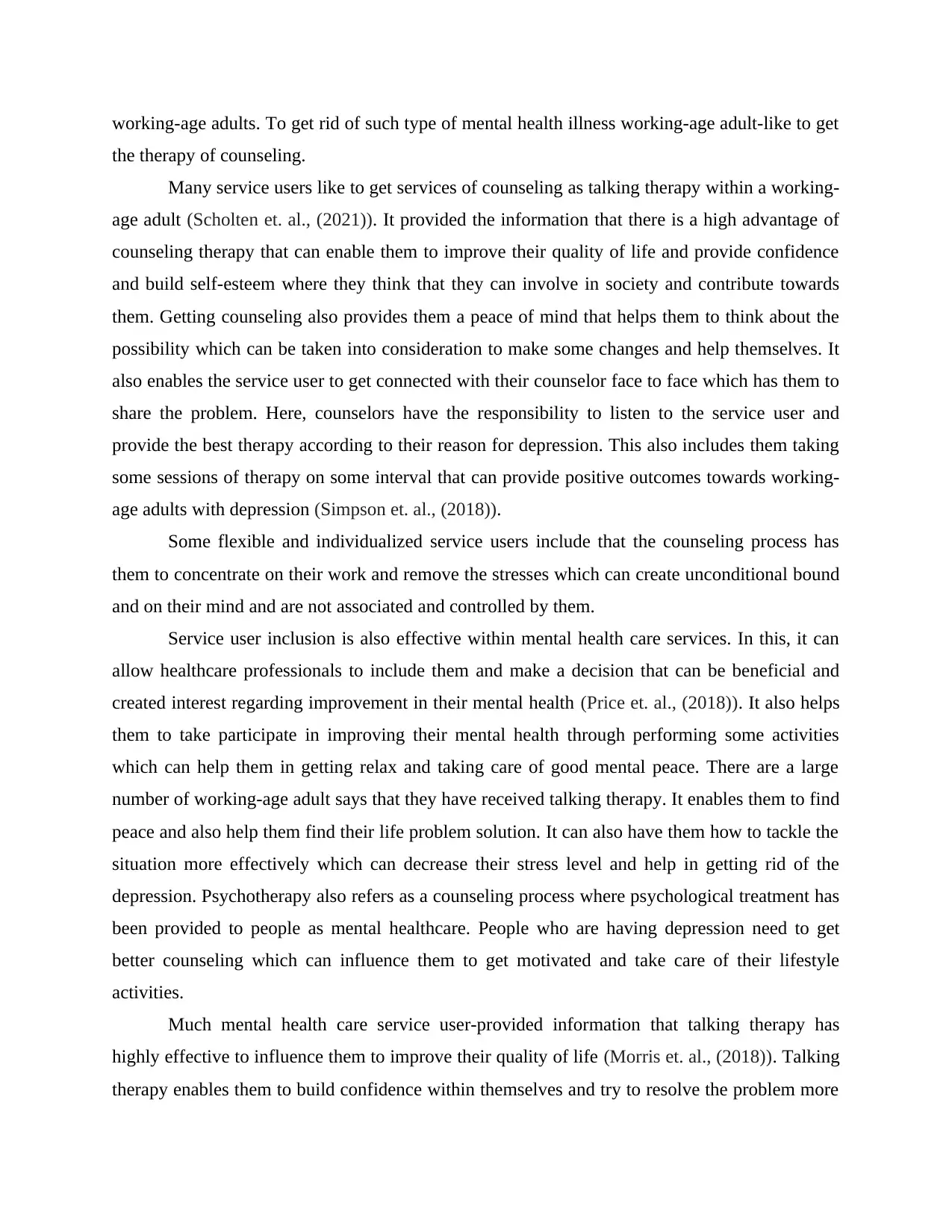
working-age adults. To get rid of such type of mental health illness working-age adult-like to get
the therapy of counseling.
Many service users like to get services of counseling as talking therapy within a working-
age adult (Scholten et. al., (2021)). It provided the information that there is a high advantage of
counseling therapy that can enable them to improve their quality of life and provide confidence
and build self-esteem where they think that they can involve in society and contribute towards
them. Getting counseling also provides them a peace of mind that helps them to think about the
possibility which can be taken into consideration to make some changes and help themselves. It
also enables the service user to get connected with their counselor face to face which has them to
share the problem. Here, counselors have the responsibility to listen to the service user and
provide the best therapy according to their reason for depression. This also includes them taking
some sessions of therapy on some interval that can provide positive outcomes towards working-
age adults with depression (Simpson et. al., (2018)).
Some flexible and individualized service users include that the counseling process has
them to concentrate on their work and remove the stresses which can create unconditional bound
and on their mind and are not associated and controlled by them.
Service user inclusion is also effective within mental health care services. In this, it can
allow healthcare professionals to include them and make a decision that can be beneficial and
created interest regarding improvement in their mental health (Price et. al., (2018)). It also helps
them to take participate in improving their mental health through performing some activities
which can help them in getting relax and taking care of good mental peace. There are a large
number of working-age adult says that they have received talking therapy. It enables them to find
peace and also help them find their life problem solution. It can also have them how to tackle the
situation more effectively which can decrease their stress level and help in getting rid of the
depression. Psychotherapy also refers as a counseling process where psychological treatment has
been provided to people as mental healthcare. People who are having depression need to get
better counseling which can influence them to get motivated and take care of their lifestyle
activities.
Much mental health care service user-provided information that talking therapy has
highly effective to influence them to improve their quality of life (Morris et. al., (2018)). Talking
therapy enables them to build confidence within themselves and try to resolve the problem more
the therapy of counseling.
Many service users like to get services of counseling as talking therapy within a working-
age adult (Scholten et. al., (2021)). It provided the information that there is a high advantage of
counseling therapy that can enable them to improve their quality of life and provide confidence
and build self-esteem where they think that they can involve in society and contribute towards
them. Getting counseling also provides them a peace of mind that helps them to think about the
possibility which can be taken into consideration to make some changes and help themselves. It
also enables the service user to get connected with their counselor face to face which has them to
share the problem. Here, counselors have the responsibility to listen to the service user and
provide the best therapy according to their reason for depression. This also includes them taking
some sessions of therapy on some interval that can provide positive outcomes towards working-
age adults with depression (Simpson et. al., (2018)).
Some flexible and individualized service users include that the counseling process has
them to concentrate on their work and remove the stresses which can create unconditional bound
and on their mind and are not associated and controlled by them.
Service user inclusion is also effective within mental health care services. In this, it can
allow healthcare professionals to include them and make a decision that can be beneficial and
created interest regarding improvement in their mental health (Price et. al., (2018)). It also helps
them to take participate in improving their mental health through performing some activities
which can help them in getting relax and taking care of good mental peace. There are a large
number of working-age adult says that they have received talking therapy. It enables them to find
peace and also help them find their life problem solution. It can also have them how to tackle the
situation more effectively which can decrease their stress level and help in getting rid of the
depression. Psychotherapy also refers as a counseling process where psychological treatment has
been provided to people as mental healthcare. People who are having depression need to get
better counseling which can influence them to get motivated and take care of their lifestyle
activities.
Much mental health care service user-provided information that talking therapy has
highly effective to influence them to improve their quality of life (Morris et. al., (2018)). Talking
therapy enables them to build confidence within themselves and try to resolve the problem more
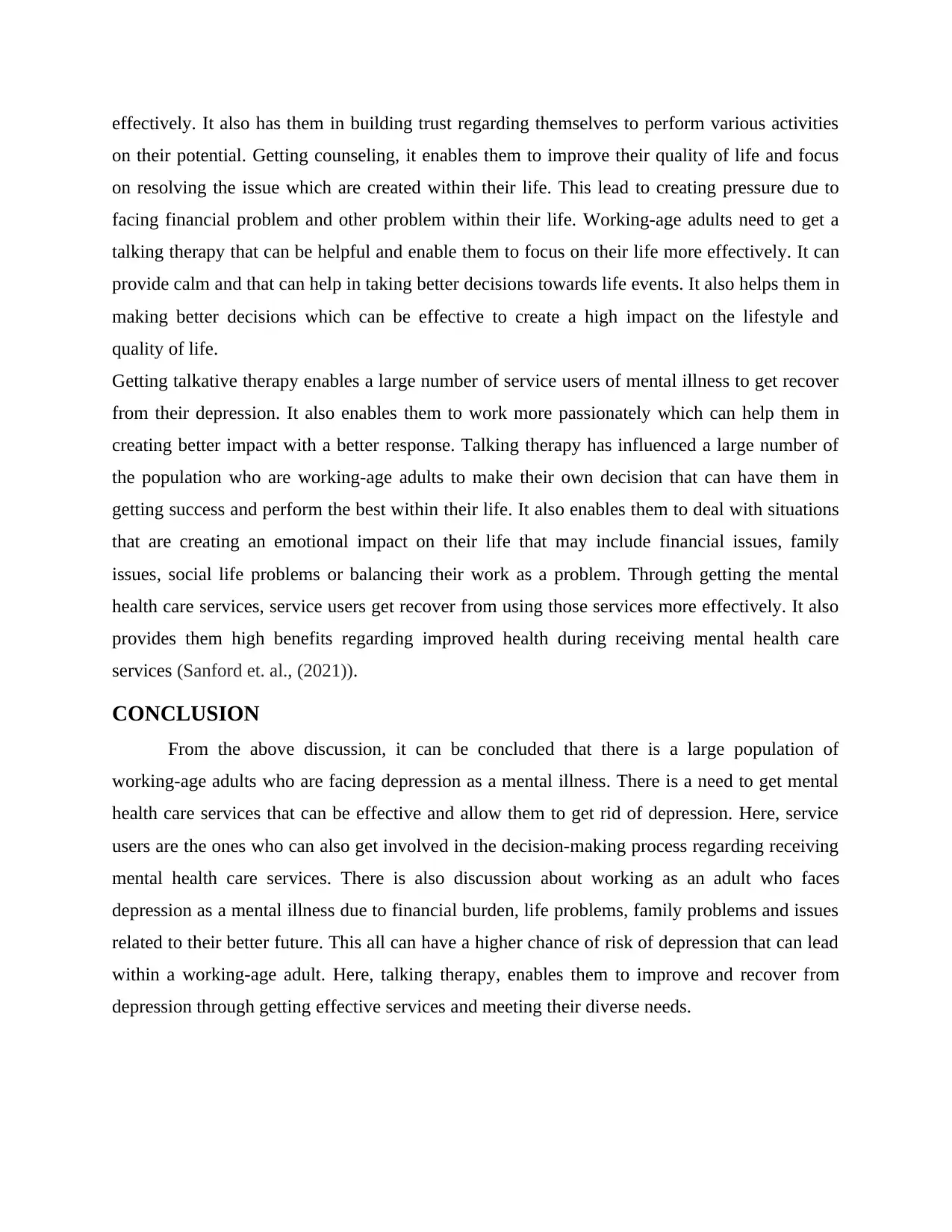
effectively. It also has them in building trust regarding themselves to perform various activities
on their potential. Getting counseling, it enables them to improve their quality of life and focus
on resolving the issue which are created within their life. This lead to creating pressure due to
facing financial problem and other problem within their life. Working-age adults need to get a
talking therapy that can be helpful and enable them to focus on their life more effectively. It can
provide calm and that can help in taking better decisions towards life events. It also helps them in
making better decisions which can be effective to create a high impact on the lifestyle and
quality of life.
Getting talkative therapy enables a large number of service users of mental illness to get recover
from their depression. It also enables them to work more passionately which can help them in
creating better impact with a better response. Talking therapy has influenced a large number of
the population who are working-age adults to make their own decision that can have them in
getting success and perform the best within their life. It also enables them to deal with situations
that are creating an emotional impact on their life that may include financial issues, family
issues, social life problems or balancing their work as a problem. Through getting the mental
health care services, service users get recover from using those services more effectively. It also
provides them high benefits regarding improved health during receiving mental health care
services (Sanford et. al., (2021)).
CONCLUSION
From the above discussion, it can be concluded that there is a large population of
working-age adults who are facing depression as a mental illness. There is a need to get mental
health care services that can be effective and allow them to get rid of depression. Here, service
users are the ones who can also get involved in the decision-making process regarding receiving
mental health care services. There is also discussion about working as an adult who faces
depression as a mental illness due to financial burden, life problems, family problems and issues
related to their better future. This all can have a higher chance of risk of depression that can lead
within a working-age adult. Here, talking therapy, enables them to improve and recover from
depression through getting effective services and meeting their diverse needs.
on their potential. Getting counseling, it enables them to improve their quality of life and focus
on resolving the issue which are created within their life. This lead to creating pressure due to
facing financial problem and other problem within their life. Working-age adults need to get a
talking therapy that can be helpful and enable them to focus on their life more effectively. It can
provide calm and that can help in taking better decisions towards life events. It also helps them in
making better decisions which can be effective to create a high impact on the lifestyle and
quality of life.
Getting talkative therapy enables a large number of service users of mental illness to get recover
from their depression. It also enables them to work more passionately which can help them in
creating better impact with a better response. Talking therapy has influenced a large number of
the population who are working-age adults to make their own decision that can have them in
getting success and perform the best within their life. It also enables them to deal with situations
that are creating an emotional impact on their life that may include financial issues, family
issues, social life problems or balancing their work as a problem. Through getting the mental
health care services, service users get recover from using those services more effectively. It also
provides them high benefits regarding improved health during receiving mental health care
services (Sanford et. al., (2021)).
CONCLUSION
From the above discussion, it can be concluded that there is a large population of
working-age adults who are facing depression as a mental illness. There is a need to get mental
health care services that can be effective and allow them to get rid of depression. Here, service
users are the ones who can also get involved in the decision-making process regarding receiving
mental health care services. There is also discussion about working as an adult who faces
depression as a mental illness due to financial burden, life problems, family problems and issues
related to their better future. This all can have a higher chance of risk of depression that can lead
within a working-age adult. Here, talking therapy, enables them to improve and recover from
depression through getting effective services and meeting their diverse needs.
Paraphrase This Document
Need a fresh take? Get an instant paraphrase of this document with our AI Paraphraser
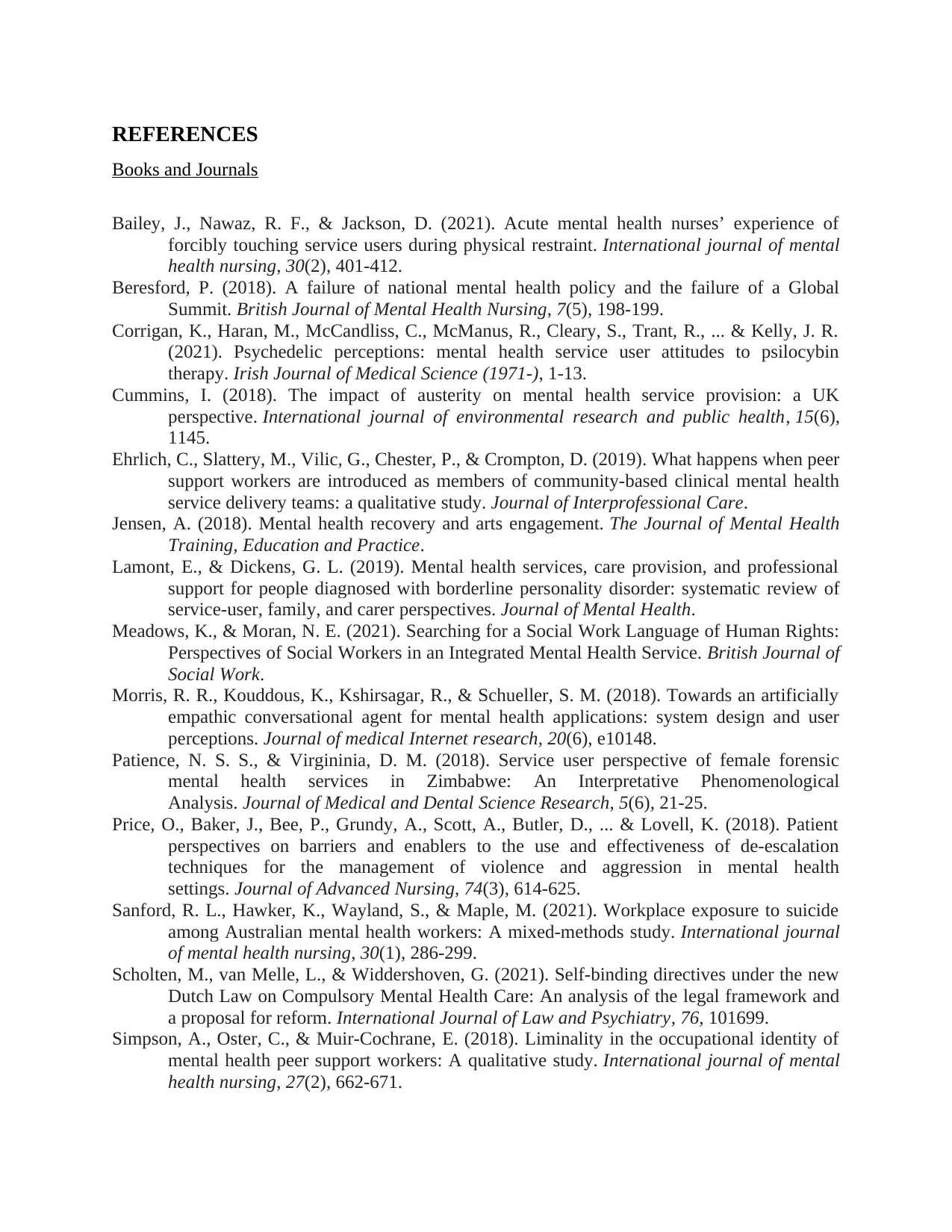
REFERENCES
Books and Journals
Bailey, J., Nawaz, R. F., & Jackson, D. (2021). Acute mental health nurses’ experience of
forcibly touching service users during physical restraint. International journal of mental
health nursing, 30(2), 401-412.
Beresford, P. (2018). A failure of national mental health policy and the failure of a Global
Summit. British Journal of Mental Health Nursing, 7(5), 198-199.
Corrigan, K., Haran, M., McCandliss, C., McManus, R., Cleary, S., Trant, R., ... & Kelly, J. R.
(2021). Psychedelic perceptions: mental health service user attitudes to psilocybin
therapy. Irish Journal of Medical Science (1971-), 1-13.
Cummins, I. (2018). The impact of austerity on mental health service provision: a UK
perspective. International journal of environmental research and public health, 15(6),
1145.
Ehrlich, C., Slattery, M., Vilic, G., Chester, P., & Crompton, D. (2019). What happens when peer
support workers are introduced as members of community-based clinical mental health
service delivery teams: a qualitative study. Journal of Interprofessional Care.
Jensen, A. (2018). Mental health recovery and arts engagement. The Journal of Mental Health
Training, Education and Practice.
Lamont, E., & Dickens, G. L. (2019). Mental health services, care provision, and professional
support for people diagnosed with borderline personality disorder: systematic review of
service-user, family, and carer perspectives. Journal of Mental Health.
Meadows, K., & Moran, N. E. (2021). Searching for a Social Work Language of Human Rights:
Perspectives of Social Workers in an Integrated Mental Health Service. British Journal of
Social Work.
Morris, R. R., Kouddous, K., Kshirsagar, R., & Schueller, S. M. (2018). Towards an artificially
empathic conversational agent for mental health applications: system design and user
perceptions. Journal of medical Internet research, 20(6), e10148.
Patience, N. S. S., & Virgininia, D. M. (2018). Service user perspective of female forensic
mental health services in Zimbabwe: An Interpretative Phenomenological
Analysis. Journal of Medical and Dental Science Research, 5(6), 21-25.
Price, O., Baker, J., Bee, P., Grundy, A., Scott, A., Butler, D., ... & Lovell, K. (2018). Patient
perspectives on barriers and enablers to the use and effectiveness of de‐escalation
techniques for the management of violence and aggression in mental health
settings. Journal of Advanced Nursing, 74(3), 614-625.
Sanford, R. L., Hawker, K., Wayland, S., & Maple, M. (2021). Workplace exposure to suicide
among Australian mental health workers: A mixed‐methods study. International journal
of mental health nursing, 30(1), 286-299.
Scholten, M., van Melle, L., & Widdershoven, G. (2021). Self-binding directives under the new
Dutch Law on Compulsory Mental Health Care: An analysis of the legal framework and
a proposal for reform. International Journal of Law and Psychiatry, 76, 101699.
Simpson, A., Oster, C., & Muir‐Cochrane, E. (2018). Liminality in the occupational identity of
mental health peer support workers: A qualitative study. International journal of mental
health nursing, 27(2), 662-671.
Books and Journals
Bailey, J., Nawaz, R. F., & Jackson, D. (2021). Acute mental health nurses’ experience of
forcibly touching service users during physical restraint. International journal of mental
health nursing, 30(2), 401-412.
Beresford, P. (2018). A failure of national mental health policy and the failure of a Global
Summit. British Journal of Mental Health Nursing, 7(5), 198-199.
Corrigan, K., Haran, M., McCandliss, C., McManus, R., Cleary, S., Trant, R., ... & Kelly, J. R.
(2021). Psychedelic perceptions: mental health service user attitudes to psilocybin
therapy. Irish Journal of Medical Science (1971-), 1-13.
Cummins, I. (2018). The impact of austerity on mental health service provision: a UK
perspective. International journal of environmental research and public health, 15(6),
1145.
Ehrlich, C., Slattery, M., Vilic, G., Chester, P., & Crompton, D. (2019). What happens when peer
support workers are introduced as members of community-based clinical mental health
service delivery teams: a qualitative study. Journal of Interprofessional Care.
Jensen, A. (2018). Mental health recovery and arts engagement. The Journal of Mental Health
Training, Education and Practice.
Lamont, E., & Dickens, G. L. (2019). Mental health services, care provision, and professional
support for people diagnosed with borderline personality disorder: systematic review of
service-user, family, and carer perspectives. Journal of Mental Health.
Meadows, K., & Moran, N. E. (2021). Searching for a Social Work Language of Human Rights:
Perspectives of Social Workers in an Integrated Mental Health Service. British Journal of
Social Work.
Morris, R. R., Kouddous, K., Kshirsagar, R., & Schueller, S. M. (2018). Towards an artificially
empathic conversational agent for mental health applications: system design and user
perceptions. Journal of medical Internet research, 20(6), e10148.
Patience, N. S. S., & Virgininia, D. M. (2018). Service user perspective of female forensic
mental health services in Zimbabwe: An Interpretative Phenomenological
Analysis. Journal of Medical and Dental Science Research, 5(6), 21-25.
Price, O., Baker, J., Bee, P., Grundy, A., Scott, A., Butler, D., ... & Lovell, K. (2018). Patient
perspectives on barriers and enablers to the use and effectiveness of de‐escalation
techniques for the management of violence and aggression in mental health
settings. Journal of Advanced Nursing, 74(3), 614-625.
Sanford, R. L., Hawker, K., Wayland, S., & Maple, M. (2021). Workplace exposure to suicide
among Australian mental health workers: A mixed‐methods study. International journal
of mental health nursing, 30(1), 286-299.
Scholten, M., van Melle, L., & Widdershoven, G. (2021). Self-binding directives under the new
Dutch Law on Compulsory Mental Health Care: An analysis of the legal framework and
a proposal for reform. International Journal of Law and Psychiatry, 76, 101699.
Simpson, A., Oster, C., & Muir‐Cochrane, E. (2018). Liminality in the occupational identity of
mental health peer support workers: A qualitative study. International journal of mental
health nursing, 27(2), 662-671.
1 out of 8
Related Documents
Your All-in-One AI-Powered Toolkit for Academic Success.
+13062052269
info@desklib.com
Available 24*7 on WhatsApp / Email
![[object Object]](/_next/static/media/star-bottom.7253800d.svg)
Unlock your academic potential
© 2024 | Zucol Services PVT LTD | All rights reserved.





